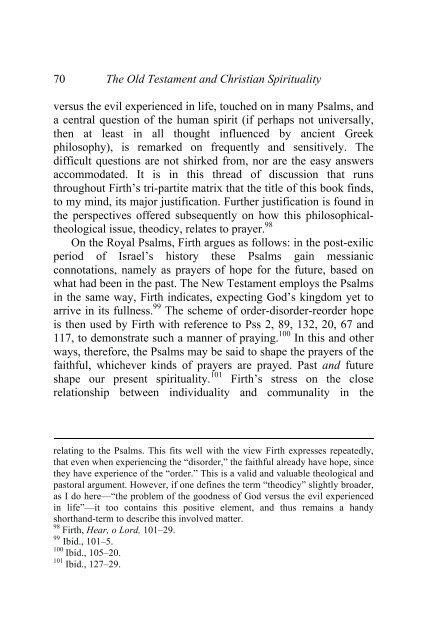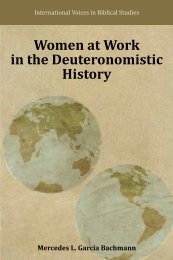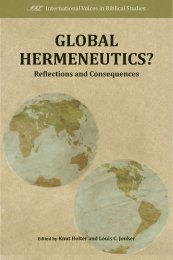The Old Testament and Christian Spirituality - International Voices in ...
The Old Testament and Christian Spirituality - International Voices in ...
The Old Testament and Christian Spirituality - International Voices in ...
Create successful ePaper yourself
Turn your PDF publications into a flip-book with our unique Google optimized e-Paper software.
70 <strong>The</strong> <strong>Old</strong> <strong>Testament</strong> <strong>and</strong> <strong>Christian</strong> <strong>Spirituality</strong><br />
versus the evil experienced <strong>in</strong> life, touched on <strong>in</strong> many Psalms, <strong>and</strong><br />
a central question of the human spirit (if perhaps not universally,<br />
then at least <strong>in</strong> all thought <strong>in</strong>fluenced by ancient Greek<br />
philosophy), is remarked on frequently <strong>and</strong> sensitively. <strong>The</strong><br />
difficult questions are not shirked from, nor are the easy answers<br />
accommodated. It is <strong>in</strong> this thread of discussion that runs<br />
throughout Firth’s tri-partite matrix that the title of this book f<strong>in</strong>ds,<br />
to my m<strong>in</strong>d, its major justification. Further justification is found <strong>in</strong><br />
the perspectives offered subsequently on how this philosophicaltheological<br />
issue, theodicy, relates to prayer. 98<br />
On the Royal Psalms, Firth argues as follows: <strong>in</strong> the post-exilic<br />
period of Israel’s history these Psalms ga<strong>in</strong> messianic<br />
connotations, namely as prayers of hope for the future, based on<br />
what had been <strong>in</strong> the past. <strong>The</strong> New <strong>Testament</strong> employs the Psalms<br />
<strong>in</strong> the same way, Firth <strong>in</strong>dicates, expect<strong>in</strong>g God’s k<strong>in</strong>gdom yet to<br />
arrive <strong>in</strong> its fullness. 99 <strong>The</strong> scheme of order-disorder-reorder hope<br />
is then used by Firth with reference to Pss 2, 89, 132, 20, 67 <strong>and</strong><br />
117, to demonstrate such a manner of pray<strong>in</strong>g. 100 In this <strong>and</strong> other<br />
ways, therefore, the Psalms may be said to shape the prayers of the<br />
faithful, whichever k<strong>in</strong>ds of prayers are prayed. Past <strong>and</strong> future<br />
shape our present spirituality. 101 Firth’s stress on the close<br />
relationship between <strong>in</strong>dividuality <strong>and</strong> communality <strong>in</strong> the<br />
relat<strong>in</strong>g to the Psalms. This fits well with the view Firth expresses repeatedly,<br />
that even when experienc<strong>in</strong>g the “disorder,” the faithful already have hope, s<strong>in</strong>ce<br />
they have experience of the “order.” This is a valid <strong>and</strong> valuable theological <strong>and</strong><br />
pastoral argument. However, if one def<strong>in</strong>es the term “theodicy” slightly broader,<br />
as I do here—“the problem of the goodness of God versus the evil experienced<br />
<strong>in</strong> life”—it too conta<strong>in</strong>s this positive element, <strong>and</strong> thus rema<strong>in</strong>s a h<strong>and</strong>y<br />
shorth<strong>and</strong>-term to describe this <strong>in</strong>volved matter.<br />
98 Firth, Hear, o Lord, 101–29.<br />
99 Ibid., 101–5.<br />
100 Ibid., 105–20.<br />
101 Ibid., 127–29.




